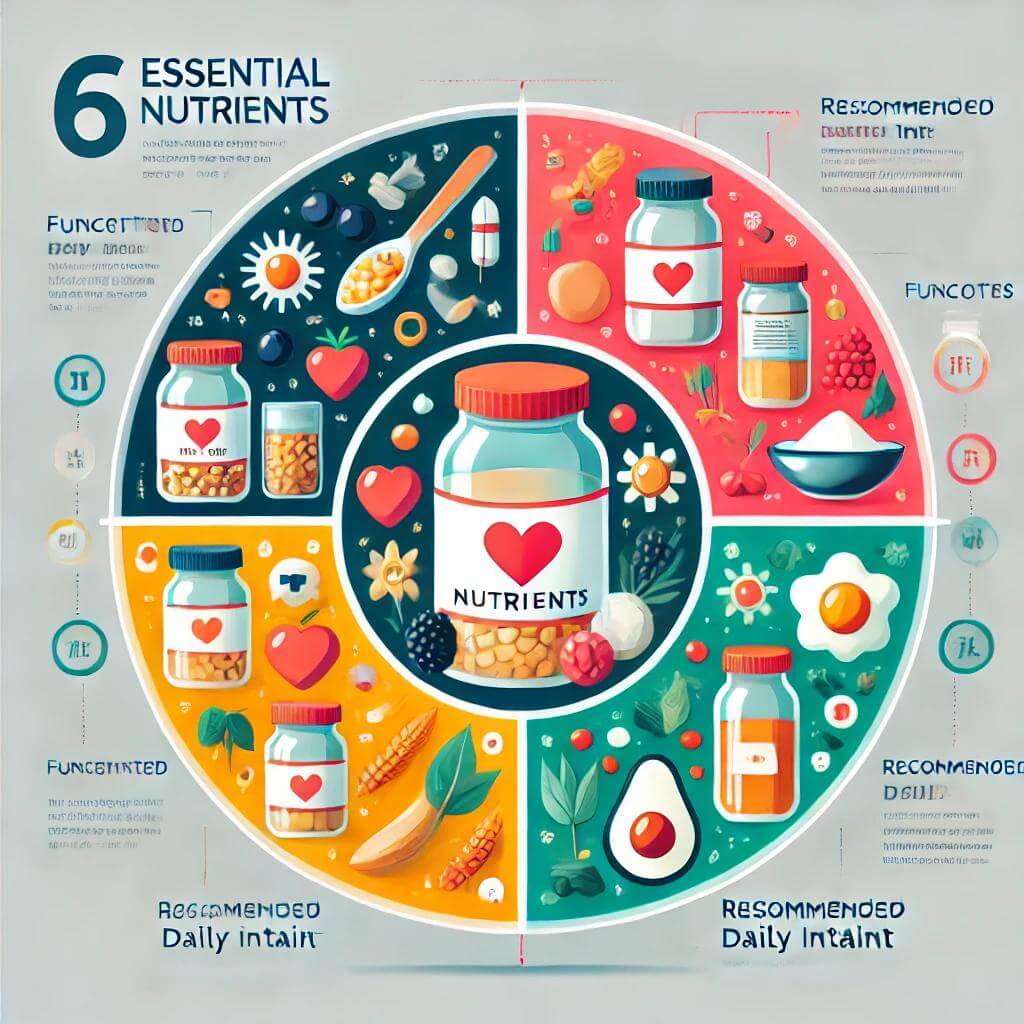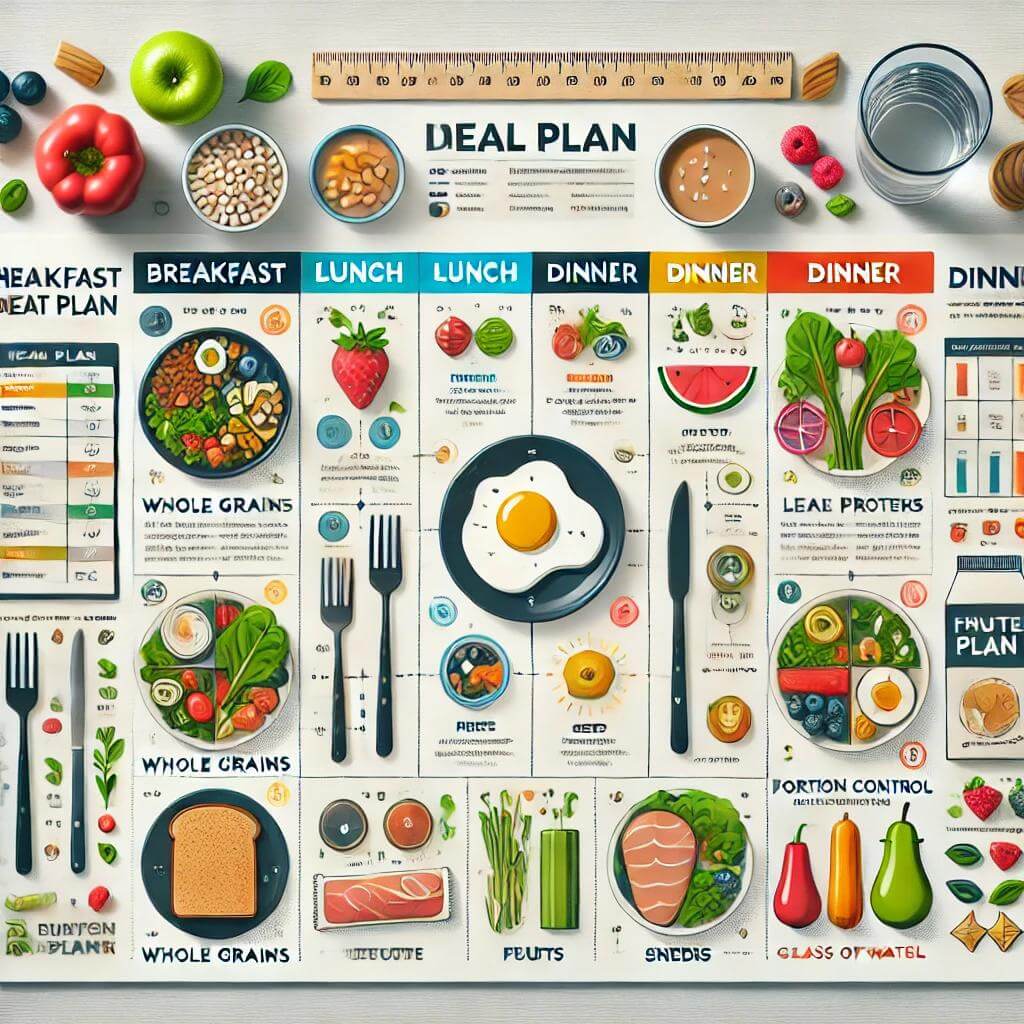Essential Nutrients: What Your Body Needs for Optimal Health
Essential nutrients are compounds that the body cannot produce or produce in sufficient quantity. These nutrients must be obtained through diet and are crucial for the body’s overall function, growth, and health. Understanding the different types of essential nutrients and the quantities required is fundamental to maintaining a balanced diet and achieving optimal health.
This article delves into the six essential nutrients, explaining their types, recommended amounts, and importance in the body’s daily functions.
The Six Essential Nutrients
1. Carbohydrates: The Body’s Primary Energy Source
- Simple vs. Complex Carbohydrates:
- Simple Carbohydrates: Found in fruits, dairy, and refined sugars. They are quickly absorbed and provide a rapid energy boost.
- Complex Carbohydrates: Found in whole grains, legumes, and starchy vegetables. They provide sustained energy and are rich in fiber, which aids in digestion.
- Recommended Daily Intake:
- 45-65% of total daily calories should come from carbohydrates.
- For a 2000-calorie diet, this equates to about 225-325 grams of carbohydrates per day.
2. Proteins: Building Blocks for the Body
- Complete vs. Incomplete Proteins:
- Complete Proteins: Contain all nine essential amino acids. Sources include meat, poultry, fish, eggs, and dairy.
- Incomplete Proteins: Lack one or more essential amino acids. Found in plant-based foods like beans, lentils, and nuts.
- Recommended Daily Intake:
- 10-35% of total daily calories should come from protein.
- The average adult requires about 46-56 grams of protein per day, depending on body weight and activity level.
3. Fats: Essential for Energy and Cell Function
- Saturated vs. Unsaturated Fats:
- Saturated Fats: Found in animal products like meat and dairy, and some plant oils like coconut oil. These should be limited due to their association with heart disease.
- Unsaturated Fats: Include monounsaturated and polyunsaturated fats found in olive oil, avocados, nuts, seeds, and fatty fish. These fats are beneficial for heart health.
- Recommended Daily Intake:
- 20-35% of total daily calories should come from fat.
- For a 2000-calorie diet, this equates to about 44-78 grams of fat per day.
4. Vitamins: Vital for Metabolism and Immune Function
- Water-Soluble vs. Fat-Soluble Vitamins:
- Water-Soluble Vitamins: Include Vitamin C and B-complex vitamins. These vitamins are not stored in the body and need to be consumed regularly.
- Fat-Soluble Vitamins: Include Vitamins A, D, E, and K. These are stored in the body’s fatty tissues and liver, and are released as needed.
- Recommended Daily Intake:
- Varies by vitamin. For example, the recommended daily intake of Vitamin C is 65-90 milligrams per day, while Vitamin D is 600-800 IU per day.
5. Minerals: Supporting Bone Health and Fluid Balance
- Macrominerals vs. Trace Minerals:
- Macrominerals: Required in larger amounts and include calcium, potassium, and magnesium.
- Trace Minerals: Needed in smaller quantities and include iron, zinc, and iodine.
- Recommended Daily Intake:
- Varies by mineral. For example, the recommended daily intake of calcium is 1000 milligrams per day for adults, while iron is 8-18 milligrams per day depending on age and gender.
6. Water: The Most Essential Nutrient
- Functions of Water:
- Regulates body temperature, aids in digestion, transports nutrients, and removes waste from the body.
- Recommended Daily Intake:
- The general recommendation is 8 glasses (64 ounces) of water per day, though individual needs may vary based on factors like activity level and climate.
Importance of Balancing Nutrient Intake
1. Maintaining Energy Levels
- A balanced intake of carbohydrates, proteins, and fats is crucial for sustaining energy throughout the day.
2. Supporting Muscle and Tissue Repair
- Protein intake is essential for muscle repair and growth, especially after physical activity.
3. Enhancing Immune Function
- Vitamins and minerals play a critical role in supporting the immune system and preventing infections.
4. Promoting Healthy Skin, Hair, and Nails
- Fats and certain vitamins, like Vitamin E, are vital for maintaining healthy skin, hair, and nails.
5. Preventing Chronic Diseases
- A diet rich in essential nutrients can help prevent chronic diseases such as heart disease, diabetes, and osteoporosis.
6. Supporting Cognitive Function
- Omega-3 fatty acids, found in unsaturated fats, are crucial for brain health and cognitive function.
Practical Tips for Ensuring Adequate Nutrient Intake
1. Diversify Your Diet
- Incorporate a wide range of foods from all food groups to ensure you get a broad spectrum of nutrients.
2. Focus on Whole Foods
- Prioritize whole, unprocessed foods over refined and processed options to maximize nutrient intake.
3. Plan Your Meals
- Meal planning can help ensure that you’re consuming a balanced diet rich in all essential nutrients.
4. Stay Hydrated
- Remember that water is an essential part of your diet and is necessary for the proper functioning of every system in your body.
5. Consider Supplements if Necessary
- While it’s best to get nutrients from food, supplements may be necessary for certain individuals, such as those with dietary restrictions or health conditions.
Summary Table
| Nutrient | Function | Recommended Daily Intake |
|---|---|---|
| Carbohydrates | Primary energy source | 225-325 grams (45-65% of calories) |
| Proteins | Building and repairing tissues | 46-56 grams (10-35% of calories) |
| Fats | Energy, cell function, nutrient absorption | 44-78 grams (20-35% of calories) |
| Vitamins | Metabolism, immune function, overall health | Varies by vitamin |
| Minerals | Bone health, fluid balance, various functions | Varies by mineral |
| Water | Hydration, temperature regulation, digestion | 8 glasses (64 ounces) |
Conclusion
Understanding the essential nutrients that your body needs is fundamental to maintaining good health. By ensuring a balanced intake of carbohydrates, proteins, fats, vitamins, minerals, and water, you can support your body’s functions and prevent deficiencies that can lead to health problems. Incorporating a variety of foods into your diet, staying hydrated, and considering supplements when necessary are all key strategies for meeting your nutrient needs.
*Disclaimer: The information provided in this article is for educational and informational purposes only and should not be construed as health advice. The content is solely the personal opinion of the author and is not intended to be a substitute for professional medical advice, diagnosis, or treatment. Always seek the advice of your physician or other qualified health provider with any questions you may have regarding a medical condition or before starting any new diet or treatment. Read more




Post Comment